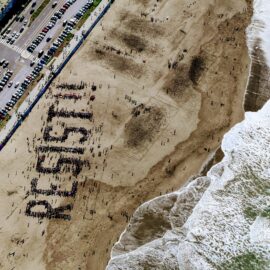

This article gives you a glimpse of what you can learn with Shortform. Shortform has the world’s best guides to 1000+ nonfiction books, plus other resources to help you accelerate your learning.
Want to learn faster and get smarter? Sign up for a free trial here .
Do you think about your job while at home? Do you want a better work-life balance?
With demanding schedules and more people working from home these days, it’s hard to separate work from personal life. The stress of work can cause unproductivity at home, a decline in mental and physical health, and can damage relationships.
We’ve rounded up the best work-life balance books to help you put a wall between your job and home life.
Finding Balance Between Work and Life
Learning to say “no” and creating strict boundaries are just a couple of ways to prevent your professional life and personal life from overlapping. Take it from the authors of the below books, who emphasize the importance of a healthy work-life balance to reduce stress and anxiety.
For most small business owners, taking a four-week vacation is inconceivable. Overwhelmed with the hands-on work of running their company’s daily operations, many entrepreneurs feel too burned out to achieve work-life balance—let alone take a holiday. However, in Clockwork, entrepreneur Mike Michalowicz claims a four-week vacation is within reach for small business owners. He argues that entrepreneurs can avoid burnout, achieve work-life balance, and revitalize their businesses by committing to a hands-off approach. A hands-off entrepreneur serves as their business’s visionary while their employees handle daily operations.
In this work-life balance book, Michalowicz presents his steps for becoming a hands-off entrepreneur with a healthy work-life balance. You’ll learn how to build a motivating business framework, train your employees to be independent, and fix your company’s big-picture issues.
In The One Thing, real estate entrepreneur Gary Keller argues that the key to extraordinary success is focusing daily on the “One Thing” that’s most important for achieving your goal, rather than scattering yourself in many directions. Keller and co-author Jay Papasan explain how to determine your goal or life purpose, then focus intensely on getting there, while avoiding pitfalls such as multitasking, relying on an unprioritized to-do list, thinking too small, misunderstanding willpower and discipline, and neglecting your personal life. When you know and focus exclusively on the most important thing every day, everything else falls into place. Extraordinary focus on One Thing brings extraordinary success.
If you’re resigned to working long hours for mediocre income, you need to read The 80/20 Principle. Entrepreneur Richard Koch reveals how you can work less, earn more, and multiply your happiness. How? Focus on the few things in your life that truly matter.
As Koch explains, 80% of results flow from 20% of inputs. According to this 80/20 Principle, only a fraction of the actions you take and the people you interact with contribute to your joy and success. Therefore, Koch says you must spend more time on what matters, and less time on what doesn’t—for example, by finding work you enjoy, spending less time on things you’re not good at, and avoiding people who drain your energy.
There isn’t enough time in the day to meet all of the work and personal responsibilities you’re swamped with, let alone keep up with email, social media, and all the things you’ve been meaning to read. In Eat That Frog, business consultant Brian Tracy says the answer is to identify your most important task—the one with the greatest consequences—and do that first each day. It’s like eating a frog: when you have a big challenge, or frog to eat, it’s best to get it out of the way first; everything after that will be easier by comparison. Based on this insight, Tracy offers a list of practical tips for improved productivity and success.
How to Stop Worrying and Start Living
None of us is a stranger to worry—our minds are clouded by ambitions and goals, relationships, work obligations, concerns about the future, generalized anxiety, and so on. Left unchecked, worry and stress can easily consume you. But, with the right mindset and skills, you can start cutting unnecessary worry from your life.
In How To Stop Worrying and Start Living, Dale Carnegie offers timeless advice for stopping worry from ruling your life. In his work-life balance book, you’ll learn how imagining a worst-case scenario can stop your anxiety, why criticism is a compliment, and why smart spending is better than a raise—and you’ll come away with the right tools to build a happier, less worried mindset.
Your Money or Your Life guides you through 9 steps to reach financial independence—not having to work for money. Unlike other personal finance books, this book is about more than budgeting to find a healthy balance between making money and enjoying life. It’s about changing your entire relationship with money and, consequently, living a more meaningful life. You’ll learn to think of money as “life energy”—the time and energy you dedicate to paid work—and use this new mindset to align your spending habits with your values, purpose, and dreams.
Transforming how you think about money is the key to having both the life you want and the money to achieve and maintain it. Now you can find that work-life balance you’ve been wanting because you won’t dread your work at home.
Books on Working Efficiently and Effectively
Finding a work-life balance is often easier said than done. Many people struggle to achieve this balance because they don’t know how to efficiently and effectively work. This ultimately causes stress and burnout.
Check out these work-life balance books to help you increase your efficiency to work effectively so you can better balance your personal and professional lives.
Many of us wish that we could become more productive, or increase the productivity of our organization. However, it’s not always clear how to do this. You may believe that you simply need to work longer hours or push yourself to work harder. But doing so won’t necessarily increase your productivity. Instead, you need to make smarter decisions about how you motivate yourself, focus, set goals, and use data effectively.
Smarter Faster Better explores the choices we can make to boost personal and organizational productivity. You’ll learn how to build a productive team, how combining different types of goals can increase your productivity, and how the makers of Disney’s Frozen avoided box-office disaster by innovating productively.
Do you feel like there just aren’t enough hours in the day? That you’re constantly checking things off your to-do list but still don’t have enough time for the important things? Your problem might be that you’re working efficiently, but not effectively.
In First Things First, Stephen R. Covey, author of The 7 Habits of Highly Effective People, presents a time-management approach that focuses on priorities, or “first things.” This approach teaches you to use your time effectively, meaning you focus more on what you’re spending your time on than how much time you’re spending. This book teaches you how to identify your priorities, schedule your time at the daily and weekly levels, and find win-win opportunities among people.
Do you feel overwhelmed by assignments, meetings, and obligations? Are you constantly interrupted by email, social media, and the urge to follow every headline? Does it feel like there’s never enough time in the day, and none for what you really want to do?
In Make Time, Jake Knapp and John Zeratsky argue that we live in an information landscape designed to steal our time and attention. In order to escape from all of our modern distractions, you must be proactive to take back your time. The authors offer tips, tricks, and hacks to reclaim control of your day-to-day life and make time for the things that matter most.
Women have it rough. Our patriarchal society has a million expectations for how they should act, look, feel, and speak in any situation. And failure to meet these expectations equates to feeling like they aren’t “enough”—humble enough, generous enough, pretty enough, strong enough, and so on. The result? Physical, mental, and emotional burnout.
In Burnout, Amelia and Emily Nagoski explain how women can handle these stressors to avoid burnout and thrive. This work-life balance book exposes the patriarchal standards that cause female stress, explores how the body responds to this stress, and explains how you can handle stress before it leads to burnout.
Final Words
A good work-life balance is key to building a healthy relationship with your work and personal life. Prioritizing one over another should never happen, and you should always advocate for a happy and healthy life.
Do you have any suggestions for work-life balance books? If so, leave them in the comments below!

Want to fast-track your learning? With Shortform, you’ll gain insights you won't find anywhere else .
Here's what you’ll get when you sign up for Shortform :
- Complicated ideas explained in simple and concise ways
- Smart analysis that connects what you’re reading to other key concepts
- Writing with zero fluff because we know how important your time is






